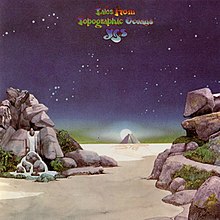Tales from Topographic Oceans
| Tales from Topographic Oceans | ||||
|---|---|---|---|---|
 |
||||
| Studio album by Yes | ||||
| Released | 7 December 1973 | |||
| Recorded | Late summer – early autumn 1973 | |||
| Studio |
Morgan Studios (Willesden, London, England) |
|||
| Genre | Progressive rock | |||
| Length | 81:15 | |||
| Label | Atlantic | |||
| Producer |
|
|||
| Yes chronology | ||||
|
||||
| Professional ratings | |
|---|---|
| Review scores | |
| Source | Rating |
| AllMusic | |
| Pitchfork | 2.2/10 |
| Robert Christgau | C |
| Rolling Stone | (unfavourable) |
Tales from Topographic Oceans is the sixth studio album from the English rock band Yes, released as a double album on 7 December 1973 by Atlantic Records. It is a concept album based on singer Jon Anderson's interpretation of a footnote in Autobiography of a Yogi (1946) by Paramahansa Yogananda that describes four bodies of Hindu texts, collectively named the shastras. After he pitched the idea to guitarist Steve Howe, the two wrote the themes and instrumentation of four side-long tracks based on each text. Keyboardist Rick Wakeman disagreed with the album's concept and the musical direction of the album, and left the group after its tour.
Following its release, Tales from Topographic Oceans received a mixed critical reception and became a symbol of progressive rock excess with its detailed concept and lengthy songs. However it was a commercial success, becoming the first UK album to qualify for Gold certification based on pre-orders alone. It topped the UK Album Chart for two weeks and reached number 6 in the US, where it reached Gold certification for over 500,000 copies sold. Yes toured the album from November 1973 to April 1974 with a set that featured the album performed in its entirety. The album was reissued in 1994 and 2003; the latter with bonus tracks. An edition with new stereo and 5.1 surround sound mixes by Steven Wilson was released in October 2016.
...
Wikipedia
